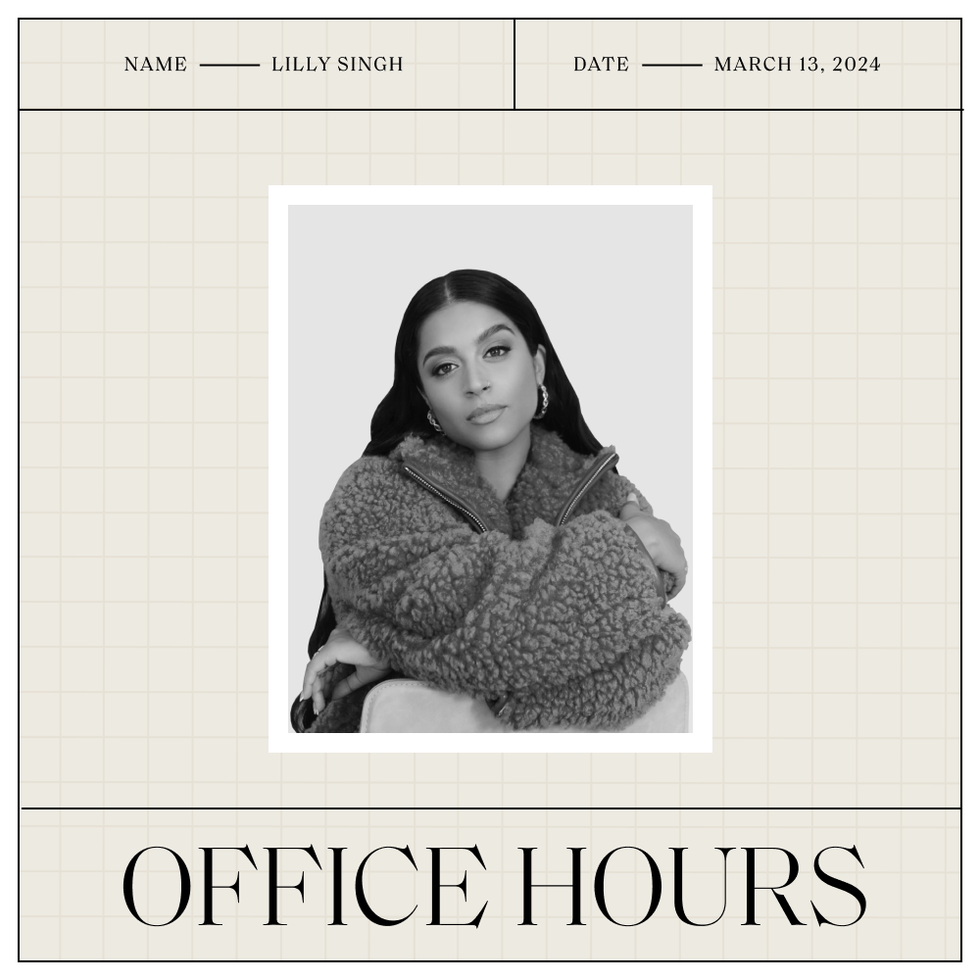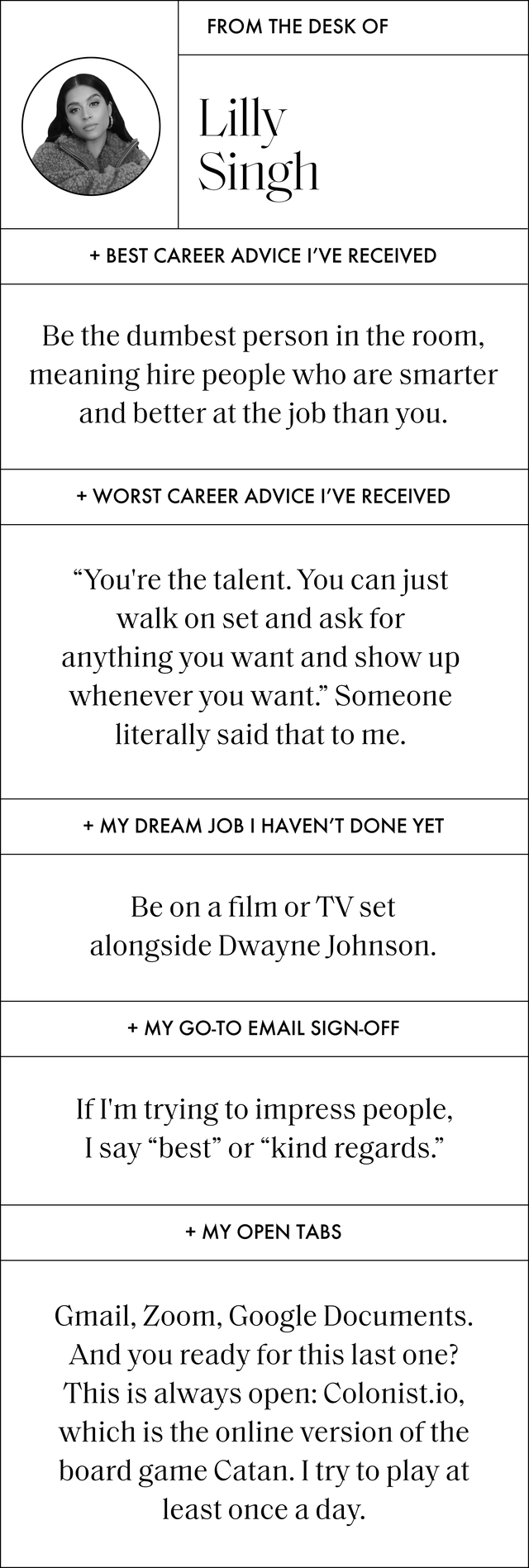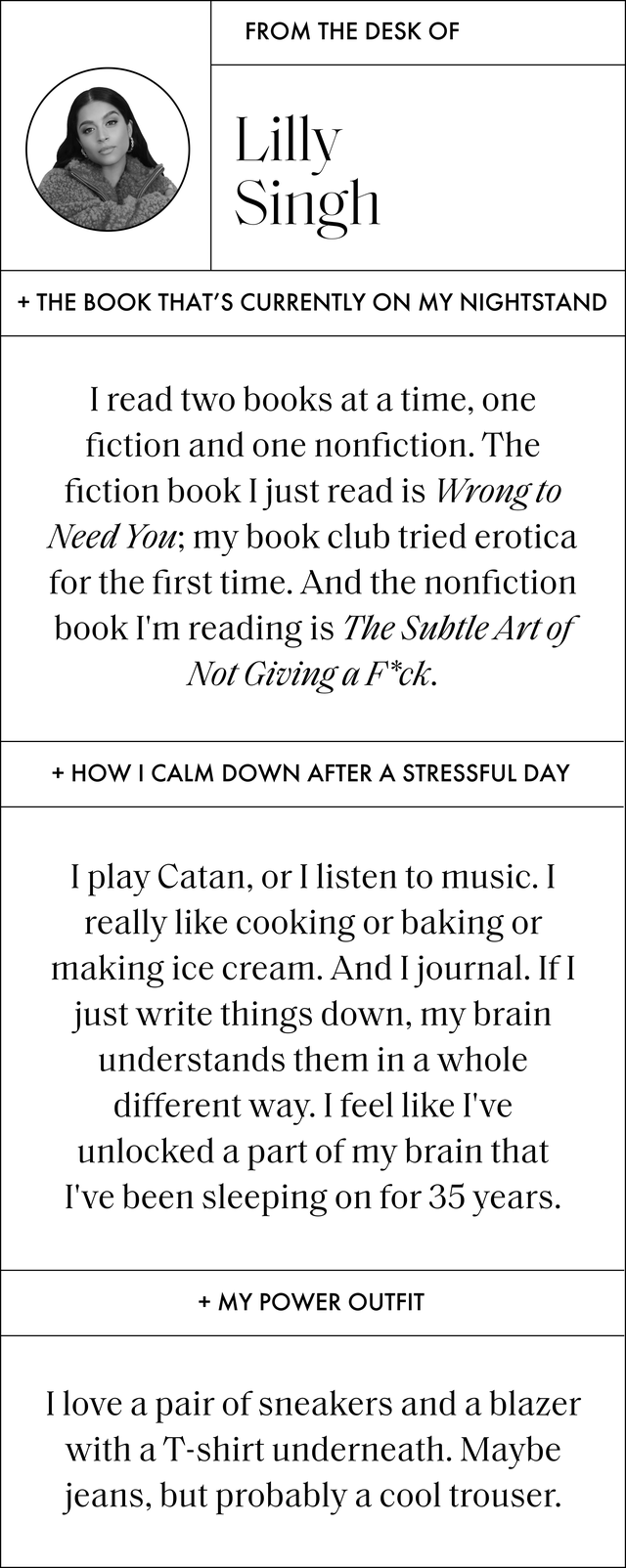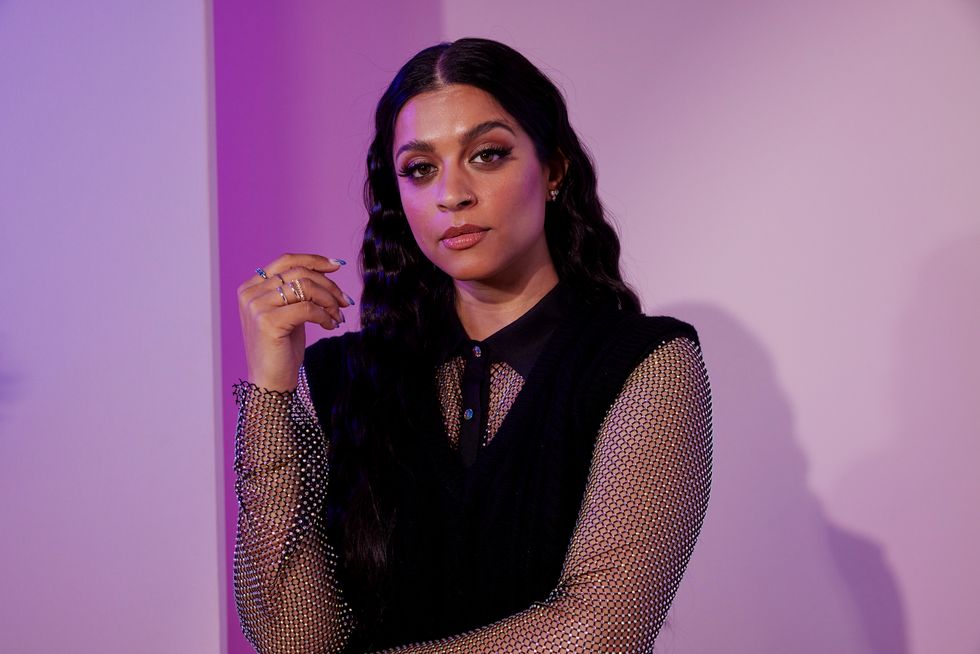
In ELLE.com’s monthly series Office Hours, we ask people in powerful positions to take us through their first jobs, worst jobs, and everything in between. This month, we spoke to Lilly Singh, who exploded as one of YouTube’s biggest creators—and comics—in the early 2010s. She then turned her attention to television, becoming the only woman hosting a late-night show on a major network in 2019. Now, the multi-hyphenate—who also authored two books, started a non-profit, and heads her own production company—just premiered her first feature film, Doin’ It, at SXSW. She co-wrote, produced, and stars in the movie. “This one was a true labor of love,” she tells ELLE.com. “I am so proud, because I have never seen anything like it. I know this sounds cliché, but if I had seen this movie when I was younger, I really think I would’ve avoided a lot of my trauma and confusion in my life.” Below, Singh takes us behind the scenes of her own career, from how her parents influenced her dutiful work ethic to how Hollywood can continue to support diverse projects like her own.
My first job
My first job was at a fast food restaurant called Harvey’s in Canada. My sister’s best friend was the manager of the location near my house, and after one of her shifts, my sister and I went to pick her up. I was literally wearing PJs with glittery kittens on them. My sister’s friend comes into the car super stressed, like, “Three different people quit. We don’t have enough people for tomorrow.” I was like, “I’m looking for a job.” So she takes me to the restaurant to meet the owner right then in my pajamas. Within five minutes, I was hired. I learned so much on that job. I learned that I really do believe in putting my all into anything I’m doing. That has been both a blessing and a curse, because I’ll put the same amount of effort into refilling forks as I will auditioning for a role. I also learned the best leaders are people who have the most experience in a variety of things. So everyone on my team has a job that I, to some extent, have done and know how to do. That involves a little bit of checking your ego to be like, do I not know this? Should I learn this? Can I actually lead in this way?

My worst job
A few years after Harvey’s, I worked at quite possibly one of the worst jobs you can have: I worked at a call center for a collection agency where I would have to phone people and say, “Hi, my name is Lilly. I’m calling to tell you that you owe this much money to this person.” You get cussed out all the time. You get hung up on all the time. No one takes you seriously. People think you’re a fraud. But on top of that, the owner of the company was horrific. The amount of times that I was on the phone with someone, about to get their credit card information, for this boss to walk in and yell: “Everybody put your calls on hold. Our numbers are not good enough!” So I learned that sometimes you need to take a step back to be like, why are we here? What are we trying to accomplish? That is a lesson I’ve taken with me in Hollywood, because so many times people will lose sight of the goal. It becomes about a whole bunch of other stuff other than what we’re all there to do.
How I first got into comedy
From a young age, I just always acted a fool. I wanted to be the center of attention, and I wanted to be in entertainment. But growing up I wasn’t too exposed to comedians, save for Russell Peters. First comedian that looked like me, that was talking about things I could relate to, that was making fun of Indian parents. That was the first time I ever watched something where I felt like, mom, dad, everyone, we’re going to get together and watch Russell Peters, and we’re all going to laugh and have a good time. I fell in love with that. When I later discovered YouTube, it didn’t occur to me that I could do comedy. I think my first video was spoken word, and then I did a tutorial. But then I was like, maybe I could replicate that feeling of people connecting to me similar to how I connected with Russell. When I did my first comedy video, it instantly clicked. Only a couple thousand people watched it, but I felt like, oh wow, this is a really powerful thing.

The way my parents influenced my career
My work ethic is 100 percent from my parents. I have one Halloween video where I imitate like seven different people—a lot of makeup changes. I recorded the whole video, so happy with it. Then, oh my God, I forgot to plug in my mic. Rerecorded the whole video. Now it’s like one in the morning. I go to edit the video, and the mic was plugged in, but it was off. I did all of it again for the third time. I get that quality from my parents. Things are unfair. Things are hard. You do it anyways. I’m not saying that’s healthy or unhealthy, but I’m just saying I get that from my parents, for sure.
Redefining what “impact” really means
After late night, I really felt like, I’m looking around, and I am alone. I have no other woman to call that can really help me in this situation. [Editor’s note: Singh’s show, A Little Late With Lilly Singh, was canceled in 2021.] I was convinced that me getting a lot of opportunities in my life was a huge win, and it was—but it was a very individual win. What I’ve learned, being in this industry, is that individual wins only go so far in changing things. I will come and go. And if no one after me has had an easy time, was that really a win? Did I really have an impact? Barbie should result in other movies like Barbie that get a chance and get big budgets. And if it doesn’t, it’s still really great, but we shouldn’t accept that as a win. We should accept change as the win.

Lilly Singh at SXSW 2024 for the premiere of DOIN’ IT.
How Hollywood can better invest in diverse storytellers
I’ve actively been developing things for years now, and I have a list on my Notes app called “Person of Color Struggles,” where I make a list of things that I would’ve never anticipated would be a hurdle while developing a project. I make this list so that I can tell other women and other people of color about them, because I was never warned. When I first started developing, I was like, oh, this is amazing I get to be in a show, and I’m the lead. This is huge. Then you get to the creation of the show, and you realize everyone that makes the decision is a man or a white person. My face is the lead of the show, but I don’t know how much influence I actually have. Sometimes I’ve worked on projects where the story is told from a South Asian female’s perspective, but now it’s my job to make sure it’s culturally accurate. We don’t have a translator there. So I have the job of four different people. We need to put the resources into actually telling those stories, and that means the resources get allocated differently on a project that is diverse. Maybe those are not line items on other shows, but you cannot copy that template on a show that’s different.
This interview has been edited and condensed for clarity.













